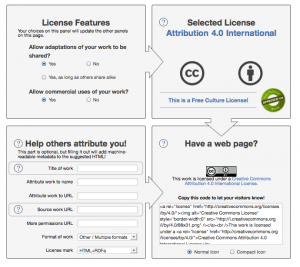A Series Showcasing Real-Life Examples of Art Meeting Code (Part 4 of 4)
Choosing the final installment of this series was difficult. We had a lot of strong contenders: a pro bono event that brought designers and programmers together, a young adult novel about cryptography — even the classic video game, Myst.
Instead, we chose to feature a tool that literally involves art meeting code — Creative Commons, a way for artists to share their work on their own terms, while still retaining copyright:
Creative Commons “Wanna Work Together” from Ryan Junell on Vimeo.
It’s a simple piece of HTML that anyone can post into their own website or blog, and it spells out in plain language exactly what uses are permitted and permitted — for instance, noncommercial use, use with credit, derivative works or “remixes,” etc.
It makes the implementation of a complex legal idea elegant, simple, and practical — a triumph of usability. More than that, the Creative Commons license was inspired by the Free Software Foundation’s GNU General Public License (GNU GPL) — the DNA of software’s Open Source Movement. You could say that Creative Commons was a very successful attempt to “port” the core concepts and principles of Open Source from the platform of software and engineering to new platforms of creative authorship (books, film, music, and visual art forms, among others).
The Internet economy is driven by content, yet artists and content creators are consistently at the very bottom of the food chain. From the likely demise of net neutrality to YouTube’s recent decision to block content from independent music labels, we are reminded that censorship does not need an authoritarian government to take hold — a corporate regime will do just fine.
Why might a license that allows free sharing be a step forward for artists? Because artists can reach a wider audience, while still retaining copyright and control of their own work. Specifically, they can negotiate better terms for commercial reuse of their work — for instance retaining rights to print, film, or television for a manuscript distributed online.
Artists who have released work under a Creative Commons license include Trent Reznor of Nine Inch Nails, and Randall Munroe, creator of the popular xkcd online comic.
Says Cory Doctorow, author of Little Brother (Tor Teen, 2010),
“For me — for pretty much every writer — the big problem isn’t piracy, it’s obscurity (thanks to Tim O’Reilly for this great aphorism). Of all the people who failed to buy this book today, the majority did so because they never heard of it, not because someone gave them a free copy…
The good news (for writers) is that this means that ebooks on computers are more likely to be an enticement to buy the printed book (which is, after all, cheap, easily had, and easy to use) than a substitute for it. You can probably read just enough of the book off the screen to realize you want to be reading it on paper.”

